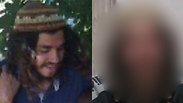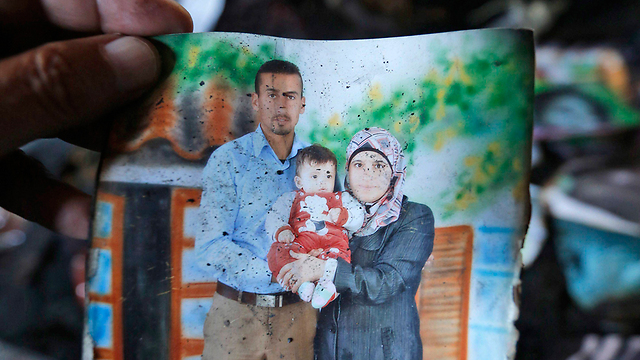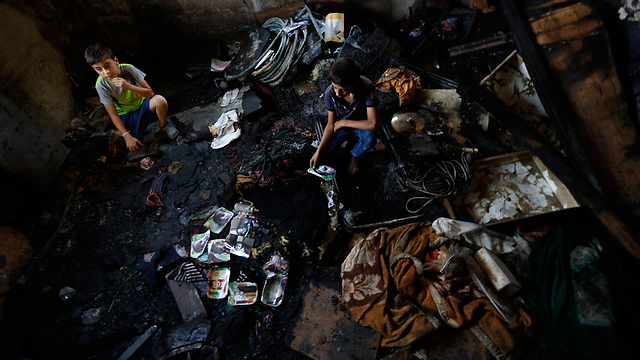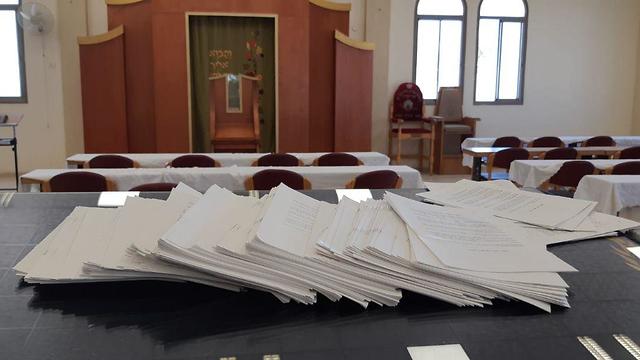

Court scraps some confessions in Duma case obtained by 'special means'
Lod District Court determines some of the confessions given by two alleged Jewish terrorists suspected of killing 3 members of the Palestinian Dawabsheh family in 2015 are admissible, including a reconstructed account of the attack provided by the central defendant, but rules other confessions obtained by unspecified means are to be struck from the record.
The publication of further details on the precise meaning of “special means” has been subjected to a gag order but the central defendant’s confession and reconstruction of the attack has been deemed admissible by the court.
While only one of his confessions was thrown out, the evidence against him remains robust.
Matters are considered more complex for the second defendant, who is a minor. A ruse used to get him to talk will remain admissible (he confessed to charges that are unrelated to the Duma incident, such as arson of a church and membership in a terror organization).
Another confession given by the minor on Duma “hypothetically”—without mentioning of names, but with a general description of the act—will also remain admissible. All of the other confessions he provided were disqualified, even if there was no force involved in their extraction.
In January 2016 an indictment was submitted against Amiram Ben-Uliel, a resident of an outpost near Shila who at the time of the attack was 21 years old. An indictment was also submitted against another man from the Samaria region of the West Bank who was 17 during the time. A gag order has remained in place since on the publication of his identity.
On July 31, 2015, Molotov cocktails were thrown at the Dawabsheh family's house in the village in the northern West Bank, killing an 18-month-old child, Ali, and critically wounded a four-year-old brother and both parents. The parents, Saad and Riham Dawabsheh later succumbed to their wounds.
Ben-Uliel stands accused of three counts of murder in the firebombing and two counts of attempted murder, arson, and conspiracy to commit a racially-motivated crime.
The minor also stands accused of conspiring to commit a murder but not of the murder itself. It is currently believed that in the end, the unnamed suspect did not take part in the actual firebombing but was involved in its planning.
In addition, he is charged with six counts of committing a series of arson offenses in other locations and other offenses.
Both defendants have denied all charges leveled against them in court despite the fact that they provided confessions during their investigations and, as noted, Ben-Uliel even reconstructed the sequence of events.
However, they later retracted their confessions and their defense attorneys urged the court to disqualify them on the grounds that they had been solicited under what were described as “special investigative means” by the Shin Bet. The attorneys claim that forceful methods were employed.
The prosecution teams however argue that the confessions are valid and that there is no reason to strike them from the evidence compiled against the defendants, particularly since there is no correlation between the means used and the confessions that were given on the days in which “special means” were not used.
According to the prosecution, the confessions were given on days subsequent to the use of the special means. Nullifying the confessions could influence the entire legal proceedings, they argue, since they constitute a central pillar of the case.
“Special investigative means” are used against people suspected of carrying out terror attacks and authorized only in cases involving what is commonly known as a “ticking time bomb,” meaning that the perpetrators may still be able to carry out further attacks.
Ben-Uliel remained silent for 17 days during his investigation, prompting the Shin Bet to change tack and employ what is known as “investigation of necessity” after receiving permission from the former attorney general Yehuda Weinstein. During the “investigation of necessity”, Ben-Uliel confessed to throwing a Molotov Cocktail into the Dawabsheh home which killed three family members.
This testimony was originally stricken from the record but four days later, follow-up investigations were carried out against Ben-Uliel during which he not only confessed again, but also reconstructed the attack, sharing details about the incident that could only have been known by the perpetrator.
These confessions, the judges concluded on Tuesday, were still valid and used as fundamental pieces of evidence in the case. The testimony provided by the second defendant is also valid and may serve to incriminate his co-conspirator.
According to the judges presiding over the trial, “special investigative means” to prevent a Jewish terror attack were justified in the case of the minor.
“The assumption of the Shin Bet investigators that the accused belonged to a rebellious network was reasonable and anchored in evidence,” a statement said. “The objectives of the investigation were of a preventive nature. To thwart future plans, the investigators needed to act to understand attacks that had been carried out by members of the rebellious network, including the attack in Duma.”
However, the judges took issue with the methods used in the “special investigative means.”
“These means struck a severe blow to the rights of the accused to protect the body and mind. Moreover, the dignity of the accused was harmed,” they added.
This, they explained, justified erasing the confessions but they also noted that their conclusion was only applicable to this particular case, and had no bearing on other trials. “This is a ruling that relates to this case only,” they emphasized.
The father of the minor said that he was pleased with the decision. “We are happy that justice has come to light and that the court ruled that our son is in no way linked to Duma. The decision by the court confirms what we have been saying the entire time: Our son underwent serious abuse during his investigation,” the father said, adding that the interrogation had caused his son to suffer from post trauma to the present day.
“We stand firm on our demand that an independent committee be immediately established to investigate the abuse and the legal authorization that was granted,” he added. “We demand that our son be released immediately from his harsh arrest and from his complete isolation.”
The lawyer representing the minor, Zion Amir, said that he believed his client would be released shortly from his arrest after two years in custody.
The Shin Bet also released a statement after the court decision.
“Regarding the defendant Amiram Ben-Uliel, to whom the murder itself is attributed, the court ruled that his confessions are valid and were given at free will,” the statement said, before turning to the minor.
“Regarding the minor, who stands accused of, among other things, conspiring to commit murder, the court decided that part of his confessions that were given by him may be used against him in legal proceedings. It should be emphasized that Shin Bet investigations are an important and central component of thwarting terror attacks of all kinds and of cracking serious terror attacks,” it pointed out.
“The information that is obtained in Shin Bet investigations saves countless lives and constitutes a tremendous contribution to state security.”
Despite the public interest in the case, judges acceded to a request submitted by the defense counsel that the legal discussions take place behind closed doors. Recently however, 20,000 copies of confidential documents concerning the findings of the investigation were distributed in synagogues across the West Bank and Jerusalem.
Each of the distributed copies includes some 15 pages of courtroom protocols from the trial.
According to the State Attorney's Office, the motive for the crime was the desire to avenge the murder of terror victim Malachi Rosenfeld who was shot dead in the vicinity of Binyamin Regional Council's Shvut Rachel settlement.
Recently, dozens of prominent Religious Zionist rabbis called on Prime Minister Benjamin Netanyahu and Justice Minister Ayelet Shaked to halt legal proceedings against the suspects, claiming that Shin Bet investigators had tortured them. The rabbis therefore demanded that an investigative committee be created to look into the matter.



















